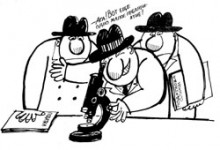The level of economic freedom in Ukraine has dropped sharply in 2000, as evidenced by the Heritage Foundation report carried recently by The Wall Street Journal . The organization’s annual Economic Freedom Index shows Ukraine to have dropped 17 points compared to last year’s; it is placed 133rd among the “predominantly unfree” world economies. There is a noticeable decline in the sphere of trade, increasing fiscal pressure, and government meddling in economic management, says Heritage expert Ariel Cohen.
With regard to Ukrainian trade policy (indexed at 3, meaning moderate protectionism), experts point to the government using opaque standards and import licenses. Tax efficiency rating is 4.5, and it is noted that Ukraine’s highest personal income tax rate is 40%, with 20% being the average; the highest profit tax is 30%. In 1998, government disbursements amounted to 39% of GNP. The government business interference rating is 4. It went down one point, allowing for government spending estimated at 26.1 GNP, compared to the previous 22.7%, reads the Heritage report.
For a number of years the Economic Freedom Index, based on fifty economic indices in ten main categories, has been considered a reliable economic indicator in most countries. The report confirms a direct link between the level of economic freedom and that of per capita income. World Bank statistics show that, while in the “predominantly unfree” and “purged” economies the per capita income was in the neighborhood of $2,800 in 1998 but was four times higher ($11,054) in the “predominantly free” and another two times higher ($21,206) in the “free” countries.
Estonia remains the most liberal of the former Soviet republics, placed 14th among the world’s leading economies. Last year, its rating grew by eight points. Lithuania rose by nineteen points, currently placing 42nd. There is noticeable progress in Armenia. The situation in Russia remains the same, while Moldova registers a dramatic decline. Index criteria include the banking and financial sectors, capital flow, foreign investment, fiscal pressure, government interference in the economy, shadow economy size, wages and salaries, prices, property rights, regulation in the business sphere, etc. A most impressive list. It should be noted that Ukraine’s rating fell after the presidential campaign when that a “window on fresh opportunities” was opened and supposedly the country’s most liberal Cabinet formed. However, the Ukrainian experience shows that the image of reformers and the actual economic process are different things.
COMMENTARY
Oleksandr KARPOV, Director, Ukrainian Europay Association:
I can see why Ukraine’s ratings have dropped. Suffice it to recall our decision to introduce electronic cash registers and steps taken to suppress simplified tax procedures. Those were serious mistakes by the government. But why has the general business climate worsened in this country? Primarily because there is no effective system of management. Every minister acts the way he sees fit and far from all presidential decrees are carried out by the Cabinet. Parliament and Cabinet are still at odds... All this does not improve business conditions. By contrast, our northern neighbor, Russia, is trying to give an impetus to liberal reform while restricting political freedoms. In Ukraine, the situation is even worse, because our declarations actually remain on paper.
Stanislav ARZHEVITIN, AZHIO Bank:
The most attractive economic sectors are allocated between groups capable of lobbying for their own interests, thus taking a dominant stand on the most important markets. All the other markets depend on them, so we do not yet have a free economic environment. There is some progress, but it will yield results only after some time. It’s like having an operation. First, the patient feels bad and then recovers. I think that the Western experts recorded precisely that intensive care unit period to be followed by recuperation. The main thing is that we are not backing up but continue to move forward.
Serhiy LYTVYNOV, Director General, Minolta Ukraine:
Contraband is the greatest obstacle in my line of business. Our company plays fair, it is transparent, we pay taxes, and make the other [legally required] payments. Of course, there are other companies acting the same way, but most of our rivals prefer smuggling goods into Ukraine or using other illicit techniques. I don’t think that such practices are evidence of a free economy, because a free economy envisages equal conditions for all. And I must admit that the state does nothing to combat contraband. Here is another example from our business practices. A public prosecutor in a Ukrainian city did not want to pay for the repair of office equipment, so he arranged for a thorough inspection of our local branch. What kind of economic freedom can you expect if any local bureaucrat can make an entire firm stop functioning?
P.S.: Of course, the comments cited cannot give a complete picture of the Ukrainian business environment. The Day welcomes Ukrainian businesspeople, especially those representing small and medium businesses, to share their views on the subject.







